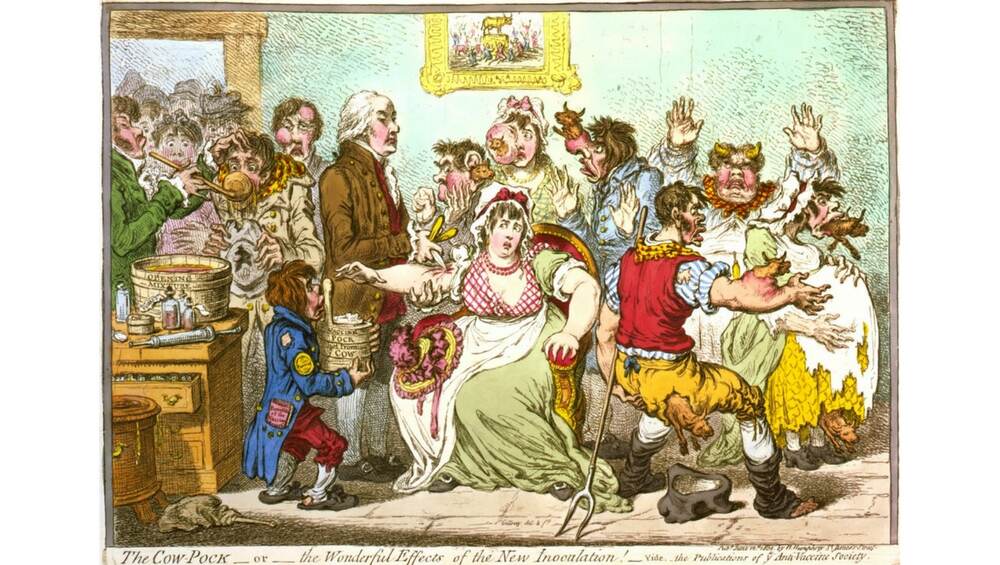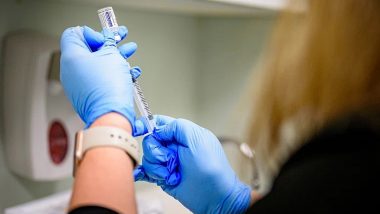The Punjab Government kick-started a state-wide Measles Rubella (MR) Vaccination Campaign as part of the state’s plan to eradicate measles and rubella. The State Health and Family Welfare Minister had spoken at the time of the rollout that all children, ranging from age nine to 15 would be inoculated, whether they were vaccinated with MR in the past or not. But their efforts have been marred by videos going viral on social media, warning parents against vaccinating their children. And according to media reports, many parents have taken the bait and have refused to send their children to school on the vaccination dates.
Every year, inoculating children against deadly diseases saves 2-3 million lives worldwide. These numbers are akin to the population of an entire city. Sadly, one in seven children is excluded from this life-saving vaccines due to lack of awareness, poverty or inaccessibility of medical treatment. Increasing vaccine coverage in low and middle-income countries by 2030 may prevent 24 million people from going poor due to the financial burden of health expenses. To be denied this life-saving tool due to poverty is one thing. But nothing justifies well-to-do parents from educated countries refusing vaccines for their children. It is not only selfish but an irresponsible thing to do.
What is the Fuss About MMR vaccine?
Measles, Mumps and Rubella are infectious diseases that can cause severe complications in children, which includes brain damage and death. If women who are not immunised against rubella contract the disease during pregnancy, it can cause miscarriage or birth defects in their child. The MMR vaccine is given to the child at 9, 12 and 15 months of age. Here are four important vaccines for children.

Protests against immunisation is not a new thing; in 1998, media reports of a possible link between the MMR (Measles, Mumps and Rubella) vaccine and autism or bowel diseases made many parents question the safety of vaccination. Soon, ‘Anti Vaxxers’ were up in arms against vaccines due to half-baked notions of how vaccines can harm children.
It all started with a study published in Lancet by AJ Wakefield et al. titled Ileal-lymphoid-nodular hyperplasia, non-specific colitis, and pervasive developmental disorder in children, which claimed that children developed chronic enterocolitis and regressive developmental disorder like autism after they were given MMR vaccine. But immediately after the controversial study was published, it was panned by experts for two reasons. Firstly, they used a small sample size of 12 children, 9 of whom were autistic. The size was too small to make any claims regarding the connection. Secondly, the researchers were accused of selection bias because the parents of 8 of the children selected for the study were themselves biased against the MMR. The paper has since been retracted.
One of the possible reasons of the MMR-autism link is that the age when MMR is first given (12-15 months) coincides with the age when autism is first recognised. Independent research on the topic also absolves vaccination since it failed to establish any connection with MMR and autism. In a Medical Research Council seminar in 1998, 37 experts in virology, epidemiology, gastroenterology, immunology, paediatrics, autism and child psychiatry came together to examine available data to conclude that none of the so-called evidence supported the MMR-autism link.
Are There Any Risks of Vaccination?
Immediately after inoculation, children may experience some side effects. The MMR vaccine, for example, does cause fever in 1 in 6 children 7-12 days after immunisation. And one in 3,000 develops febrile seizures. But this is not a reason to not inoculate your child because the side effects are transient and the benefits of MMR outweigh the risk of side recognised side effects.
Some Indirect Benefits of Vaccinating your Child
The direct benefit of protecting your child from life-threatening illnesses aside, vaccines have a lot of indirect benefits.
Child Development and Health: A normal childhood without the burden of diseases enables normal anatomical and physiological development of children from infancy to adulthood. Children afflicted by infectious conditions, which could have been prevented by vaccines, can’t retain nutrients and are at a higher risk of malnutrition. A study on Kenyan children under five years of age found that vaccination against polio, BCG, DPT and measles had a protective effect against stunting in children.
Improves School Performance: Studies have confirmed that vaccinating children against measles translates to improved performance in schools. Better health is associated with higher educational attainment but many infectious, vaccine-preventable diseases affect the child’s mental processes like recall, attention, memory and cognition. By vaccinating your child, you will ensure that they excel in their scholastic performance.
Saves Money: Prevention is better and more cost-effective than cure. WHO calls vaccines “one of the most cost-effective health tools ever invented” since every $1 spent on childhood immunisation effects returns of $44 in economic and social benefits. Apart from saving lives, immunisation also helps families from slipping into a certain poverty due to the burden of health expenses.
With social media tools like Facebook and Whatsapp now at the disposal of every individual, we face a risk of anti vaccine rumours spreading at the speed of light. USA is already paying the price of failing to keep Anti Vaxxers in check because previously eradicated diseases like measles made a come back in the last couple of years. Falling for such rumours may have far reaching consequences on not only your own child's health but also the health of the community at large. That's why it is important for every parent to make an informed decision about immunising their children and not fall for scaremongering rumours.
(Reference: Is the MMR vaccine safe?)
(The above story first appeared on LatestLY on May 02, 2018 12:48 PM IST. For more news and updates on politics, world, sports, entertainment and lifestyle, log on to our website latestly.com).













 Quickly
Quickly












 Is the MMR vaccine safe?
Is the MMR vaccine safe?




Is Vaccination Safe for Your Child? Here’s What Every Parent Should Know about the MMR Vaccine
The only study that linked MMR vaccine to autism is now debunked and retracted.
The Punjab Government kick-started a state-wide Measles Rubella (MR) Vaccination Campaign as part of the state’s plan to eradicate measles and rubella. The State Health and Family Welfare Minister had spoken at the time of the rollout that all children, ranging from age nine to 15 would be inoculated, whether they were vaccinated with MR in the past or not. But their efforts have been marred by videos going viral on social media, warning parents against vaccinating their children. And according to media reports, many parents have taken the bait and have refused to send their children to school on the vaccination dates.
Every year, inoculating children against deadly diseases saves 2-3 million lives worldwide. These numbers are akin to the population of an entire city. Sadly, one in seven children is excluded from this life-saving vaccines due to lack of awareness, poverty or inaccessibility of medical treatment. Increasing vaccine coverage in low and middle-income countries by 2030 may prevent 24 million people from going poor due to the financial burden of health expenses. To be denied this life-saving tool due to poverty is one thing. But nothing justifies well-to-do parents from educated countries refusing vaccines for their children. It is not only selfish but an irresponsible thing to do.
What is the Fuss About MMR vaccine?
Measles, Mumps and Rubella are infectious diseases that can cause severe complications in children, which includes brain damage and death. If women who are not immunised against rubella contract the disease during pregnancy, it can cause miscarriage or birth defects in their child. The MMR vaccine is given to the child at 9, 12 and 15 months of age. Here are four important vaccines for children.
Protests against immunisation is not a new thing; in 1998, media reports of a possible link between the MMR (Measles, Mumps and Rubella) vaccine and autism or bowel diseases made many parents question the safety of vaccination. Soon, ‘Anti Vaxxers’ were up in arms against vaccines due to half-baked notions of how vaccines can harm children.
It all started with a study published in Lancet by AJ Wakefield et al. titled Ileal-lymphoid-nodular hyperplasia, non-specific colitis, and pervasive developmental disorder in children, which claimed that children developed chronic enterocolitis and regressive developmental disorder like autism after they were given MMR vaccine. But immediately after the controversial study was published, it was panned by experts for two reasons. Firstly, they used a small sample size of 12 children, 9 of whom were autistic. The size was too small to make any claims regarding the connection. Secondly, the researchers were accused of selection bias because the parents of 8 of the children selected for the study were themselves biased against the MMR. The paper has since been retracted.
One of the possible reasons of the MMR-autism link is that the age when MMR is first given (12-15 months) coincides with the age when autism is first recognised. Independent research on the topic also absolves vaccination since it failed to establish any connection with MMR and autism. In a Medical Research Council seminar in 1998, 37 experts in virology, epidemiology, gastroenterology, immunology, paediatrics, autism and child psychiatry came together to examine available data to conclude that none of the so-called evidence supported the MMR-autism link.
Are There Any Risks of Vaccination?
Immediately after inoculation, children may experience some side effects. The MMR vaccine, for example, does cause fever in 1 in 6 children 7-12 days after immunisation. And one in 3,000 develops febrile seizures. But this is not a reason to not inoculate your child because the side effects are transient and the benefits of MMR outweigh the risk of side recognised side effects.
Some Indirect Benefits of Vaccinating your Child
The direct benefit of protecting your child from life-threatening illnesses aside, vaccines have a lot of indirect benefits.
Child Development and Health: A normal childhood without the burden of diseases enables normal anatomical and physiological development of children from infancy to adulthood. Children afflicted by infectious conditions, which could have been prevented by vaccines, can’t retain nutrients and are at a higher risk of malnutrition. A study on Kenyan children under five years of age found that vaccination against polio, BCG, DPT and measles had a protective effect against stunting in children.
Improves School Performance: Studies have confirmed that vaccinating children against measles translates to improved performance in schools. Better health is associated with higher educational attainment but many infectious, vaccine-preventable diseases affect the child’s mental processes like recall, attention, memory and cognition. By vaccinating your child, you will ensure that they excel in their scholastic performance.
Saves Money: Prevention is better and more cost-effective than cure. WHO calls vaccines “one of the most cost-effective health tools ever invented” since every $1 spent on childhood immunisation effects returns of $44 in economic and social benefits. Apart from saving lives, immunisation also helps families from slipping into a certain poverty due to the burden of health expenses.
With social media tools like Facebook and Whatsapp now at the disposal of every individual, we face a risk of anti vaccine rumours spreading at the speed of light. USA is already paying the price of failing to keep Anti Vaxxers in check because previously eradicated diseases like measles made a come back in the last couple of years. Falling for such rumours may have far reaching consequences on not only your own child's health but also the health of the community at large. That's why it is important for every parent to make an informed decision about immunising their children and not fall for scaremongering rumours.
(Reference: Is the MMR vaccine safe?)
(The above story first appeared on LatestLY on May 02, 2018 12:48 PM IST. For more news and updates on politics, world, sports, entertainment and lifestyle, log on to our website latestly.com).